Franz Schubert
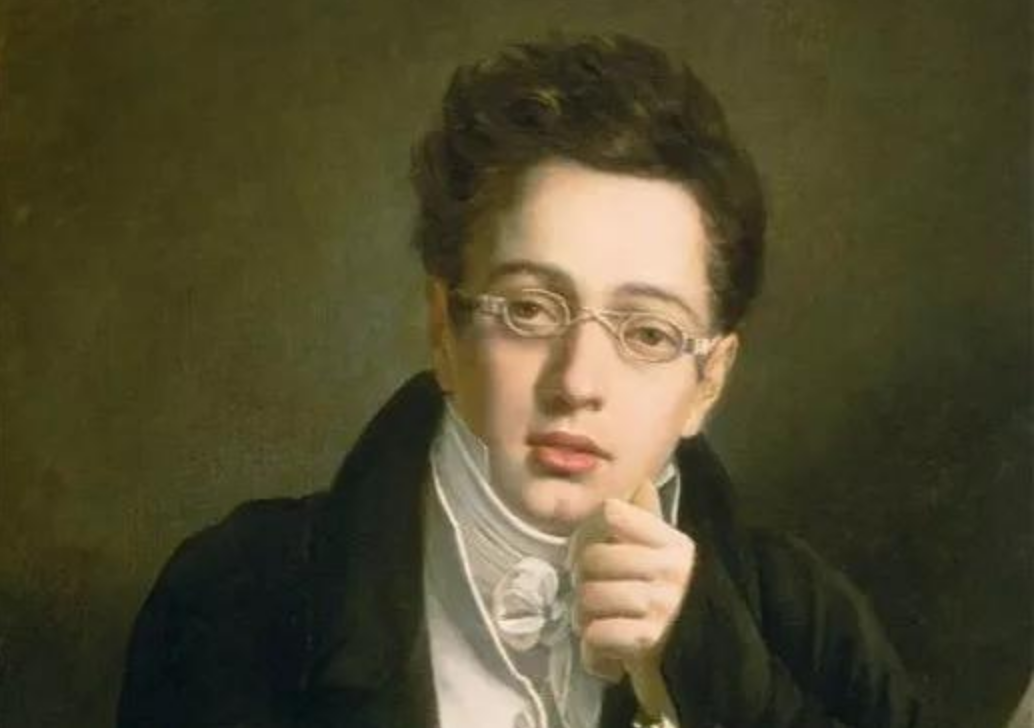
Musical Muscle
Schubert is undoubtedly one of the greats, and possibly the finest songwriter that ever lived. In less than 32 years, he came up with over 600 lieder, nine symphonies, a fair number of masses, quite a few operas, a magnificent body of chamber music and some exceptional piano works. Under-appreciated in his own time, Schubert is seen today as one of the leading geniuses of the romantic period. His style, which broke from classical form to explore a more freely rhapsodic compositional method, influenced Mendelssohn, Schumann and Brahms and he’s frequently cited as key to the development of generations of songwriters from Mahler to Britten.
The Goss
Although a relatively law-abiding citizen, Schubert had a reputation for drink and kept riotous company with a tight circle of friends. In 1820, the composer and four companions were arrested by the Austrian police on charges of suspected “revolutionary activities”. They were “severely reprimanded”, largely for “inveighing against officials with insulting and opprobrious language”. Of course, somewhere around 1822, Schubert picked up the nasty little disease that ultimately curtailed his brilliant career. It’s generally put down to a casual encounter with a prostitute – the gender is more often disputed.
Out and Proud?
A contentious one, Herr Schubert. Despite suggestions that he was a woman chaser in his youth, many musicologists consider that there is evidence, particularly in the songs, to suggest that he was erotically attracted to men – the accompanist Graham Johnson, for example, is in no doubt. His room mate for some years, Johann Mayrhofer, was certainly gay and Schubert was most definitely attracted to Mayrhofer’s poetry, much of it laced with homoerotic references. Songs such as Ganymede, in which a randy old God carries off a pretty young lad who cries “Ich komm’, ich komme!” certainly seem a little on the pink side. Throughout the 1820s, Schubert was part of a close-knit circle of exclusively male artists and students whose social gatherings became known as “Schubertiads”. So that proves it then.
Phwoar Factor
Less than five feet tall, “Schwämmerl”, or “little mushroom”, as he was known to his friends was hardly raw sex on legs. The traditional portraits of the composer in his mid to late twenties show a rather podgy, bespectacled fellow who could have taken more care in matters of personal grooming. Nevertheless, a seldom seen portrait of the artist as an adolescent youth shows something of a young hottie – the price we pay for too much time spent in the bierkeller or wursthaus is all too plain.
George Frideric Handel

Portrait of Handel, 1726–1728
Musical Muscle
The German-born Handel was undoubtedly one of the greatest composers of all time. His Water Music, Music for the Royal Fireworks, operas and oratorios remain popular to this day. He cut his musical teeth in Hamburg and Italy before settling in London in 1712 where he went on to become the most celebrated musician of his day. While there he virtually invented the English oratorio while his dramatic genius for stage works ensured that he died a wealthy man. Beethoven described Handel as “the master of us all… the greatest composer that ever lived. I would uncover my head and kneel before his tomb…Go to him to learn how to achieve great effects, by such simple means”.
The Goss
Despite mixing in the notoriously bitchy world of the opera, Handel’s essentially private nature protected him from the kind of stories that circulated about the singers of the day. Rival prima donnas could scratch and bite each other on stage, castrati could preen and fuss but Handel remained aloof. Although German by temperament, Handel wasn’t beyond a joke at the expense of a musical rival, famously playing a note on the violin in the presence of Arcangelo Corelli that the older man considered ‘unplayable’, purportedly just to get a rise out of him.
Out and Proud?
Handel was a very guarded character, about whose personality little is known, save that he ate and drank too much and had a short temper. He never married and although his sexuality is still debatable, Handel is thought by many to have been gay. As a young composer he caught the eye of Cardinal Pietro Ottoboni, whose circle of patronage included many gay Romans and the cantatas composed for their select gatherings are littered with homoerotic allusions. In England he was ‘in’ with an equally sexually ambiguous crowd, both patrons and performers. So that’s a ‘probably’, then.
Amongst a dearth of actual evidence, debate rages back and forth. One essay for example focuses on Handel’s monument in Poet’s Corner, suggesting that the sculptor, who undoubtedly new his subject, has depicted the composer in the act of revealing his nether regions. A sort of flasher in marble!
Phwoar Factor
Apparently ‘Il Caro Sassone’ (the dear Saxon) was considered quite a catch when on the Grand Tour, but sadly most of the portraits that we have show a bit of a fat German sausage with wobbly chin and bulging waistcoats. Not everybody’s cup of Liebfraumilch.
Aaron Copland
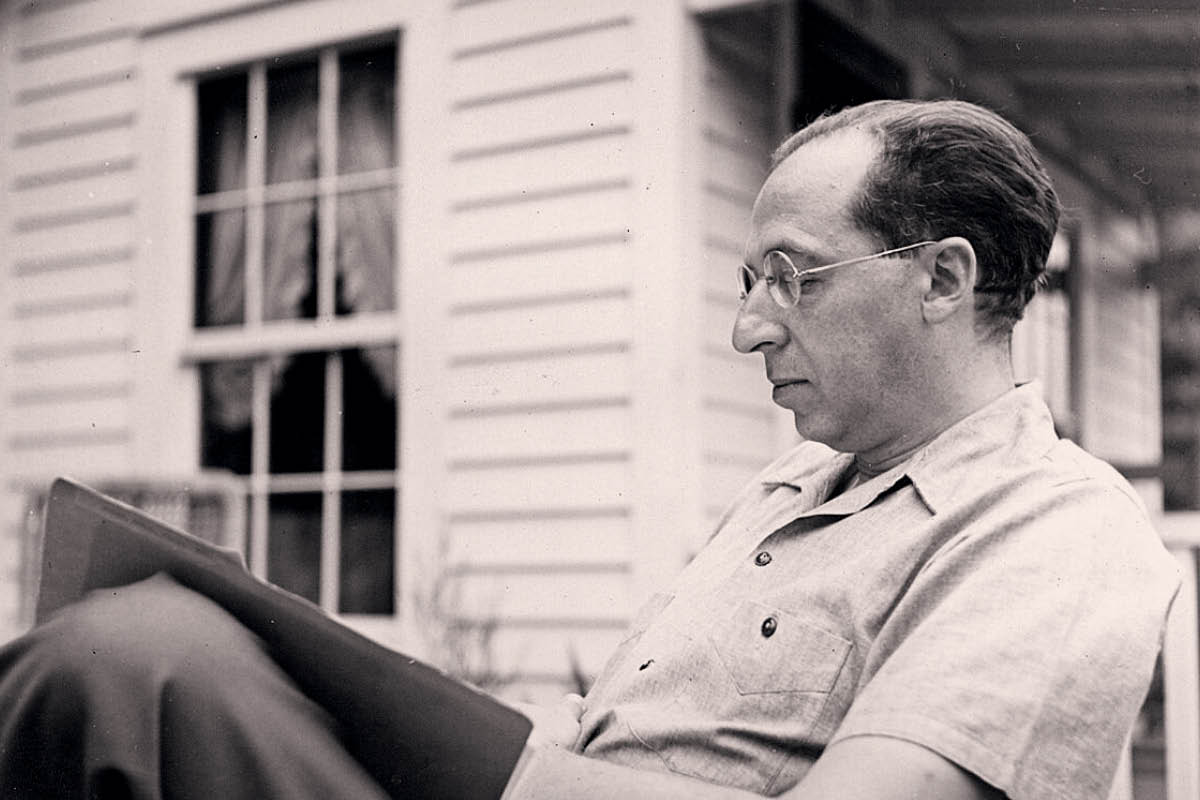
Musical Muscle
Copland was a front-runner in the creation of a distinctly American sound in classical music. In the 1930s and 1940s he composed some of the most instantly recognisable works of the last century, mostly written in his populist open-air manner (what he called his ‘vernacular’ style). The ballets Appalachian Spring and Billy the Kid have sometimes overshadowed a composer who could also write in a far tougher and more European vein, reflecting his period of study with Nadia Boulanger in Paris.
The Goss
Quiet, shy and gracious, Copland was never one for engendering salacious stories. He was, however, something of a Jewish intellectual and political left-winger and was called before Congress in 1953 to officially deny that he was a communist. Ned Rorem, composer and friend wrote about Copland’s perceived ‘goodness’: “The broad acceptance of his sanctity stems less, I think, from his sturdy need for self promotion (which all artists possess) than from his fanatic sense of the value of other people’s work (which few artists possess). Even in private Aaron is a public person, enjoying gossip but not uttering it, witty and generous, yes, but also stoic and immutable. Yet to be a saint one must have been a sinner, and it lessens the man to assume he is above temperament.” He goes on to say, “I have observed Aaron livid with impatience at the longueurs in a French peer’s sonata, heard him sigh from betrayed affection, submitted to his ire about what I’d written about a friend of his, known him to be more than tempted by the flesh. Bland sins, I admit. But then, Aaron is more artist than saint. Saints are a dime a dozen, but true art is scarce, and one could argue that Aaron Copland has changed the world for the better while Joan of Arc never changed it at all.”
Out and Proud?
Like many of his contemporaries, Copland guarded his privacy, especially in regard to his homosexuality, providing few details about his private life. However, unlike many composers of his stature, he lived openly and frequently travelled with a number of his lovers, most of whom were considerably younger artists, photographers and dancers. His love affairs, alas, mostly lasted for only a few years. Many, however, turned into enduring friendships.
Phwoar Factor
Sadly not a looker, poor old Aaron suffered from bad teeth and a receding hairline. Sporting a classic ‘nerd’ look in his youth, he went on at least to become a more lovable looking old buzzard in later life.
Ethel Smyth

Musical Muscle
Dame Ethel Smyth was an estimable British composer by any standards. The fact that she was the only notable female composer of her generation makes her even more remarkable. Musically educated in Leipzig, she became acquainted with all the leading German composers whose style she assimilated in a particularly English fashion. Her opera, The Wreckers, is considered by many to be the finest British opera between Purcell and Britten. Der Wald, another opera, is still the only work by a female composer that has ever been produced at New York’s Metropolitan. An early supporter of the suffragettes, her March of the Women became the movement’s official anthem. Tchaikovsky said of her: “Miss Smyth is one of the few women composers whom one can seriously consider to be achieving something valuable in the field of musical creation.”
The Goss
A natural rebel, there are no shortage of stories about Dame Ethel’s unorthodox behaviour. When Emmeline Pankhurst called upon suffragettes to break the windows of politicians opposed to the vote, Ethel was one of the first to respond, for which she served two months in Holloway Prison. When Sir Thomas Beecham came to visit, he found a group of women singing Smyth’s famous anthem marching around the courtyard, while the spunky Dame conducted them from an upstairs window with a toothbrush. A great golfer, mountaineer and foxhunter, Ethel’s energies knew little bounds. She famously said of herself “Because I have conducted my own operas and love sheep-dogs; because I generally dress in tweeds, and sometimes, at winter afternoon concerts, have even conducted in them; because I have written books, spoken speeches, broadcast, and don’t always make sure that my hat is on straight; for these and other equally pertinent reasons, in a certain sense I am well known.”
Out and Proud?
At a time when Queen Victoria didn’t believe that such a thing as lesbianism could actually exist, Ethel had it a little easier than her male contemporaries. She had a number of passionate affairs, nearly all of them with women. Writing to her librettist, Henry Bennet Brewster in 1892 she mused: “I wonder why it is so much easier for me to love my own sex passionately than yours. I can’t make it out for I am a very healthy-minded person.” She also fell in love with the married Emmeline Pankhurst. At the age 71 she fell in love with the writer Virginia Woolf who, rather alarmed, said it was “like being caught by a giant crab”. Despite that, the two became firm friends.
Phwoar Factor
Given to natty tweeds, game-bird feathers and the odd Tam O’Shanter, Ethel was a striking, if not exactly pretty girl. As she grew older she cultivated an image best decribed as ‘outdoor lady with faint smell of wet dog’. In later life she developed the favourite great-aunt look, although, as this picture suggests, an encounter with Virginia Woolf could lend her face a somewhat startling aspect.
Francis Poulenc
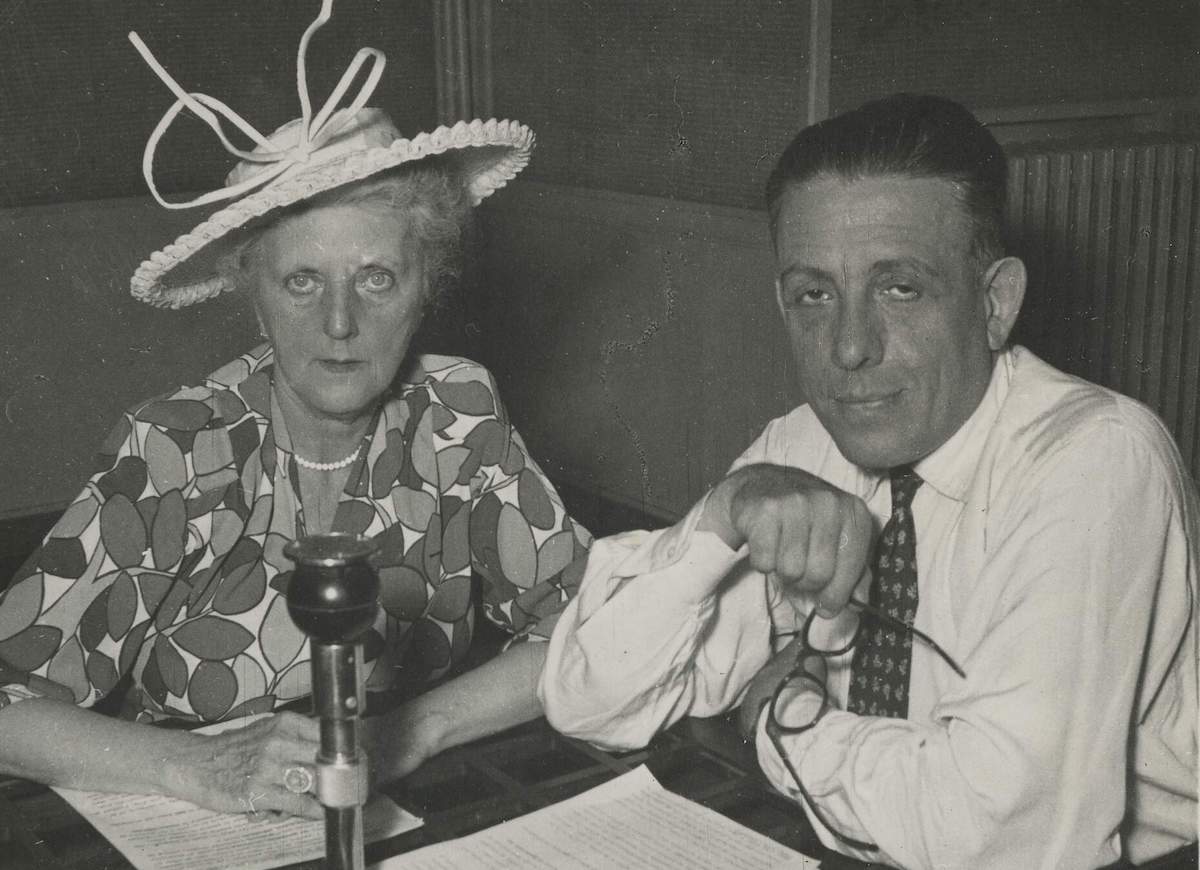
Louise Hanson-Dyer and Francis Poulenc from the Strasbourg interview. (UM Archives ID: 2016.0014.00055)
Musical Muscle
A member of Les Six, the loose-knit group of French composers who broke with the impressionism of the likes of Debussy, Poulenc embraced a more irreverent aesthetic influenced by existentialism and the music hall. He composed across all genres and works like his choral Gloria, the opera Dialogues des Carmelites and the organ concerto are firmly in the repertoire. Although his music is essentially tonal, he peppers it with pungent harmonic discords. Witty musical sidesteps add to his unpredictable charm. Above all, his music has a gaiety – in every sense of the word.
The Goss
“Half monk, half rascal”, according to Claude Rostand, Poulenc was a natural wit with a bit of a bitchy streak. His writings and reported jokes and conversations are peppered with double entendres, many of them about attractive young men. A collaborator with the likes of Jean Cocteau, his works had their fair share of scandals. Les Mamelles de Tiresias for example has a woman releasing balloon breasts and throwing a pissoir out of a window. He also composed some naughty little songs such as his Chansons Gaillardes, one of which invites a virgin to pleasure herself with a votive candle while waiting for a lover. Ooh la la!
Out and Proud?
In many ways a typical Frenchman, Poulenc was undoubtedly one of the first openly gay composers with a fair few identifiable lovers. No respecter of social class. his final partner was a tradie. He rather let the side down in 1928 when he proposed a marriage of convenience to Raymonde Linossier. but she made it quite clear that she had no intention of becoming his ‘beard’. Writing on the score of his delightful Concert Champêtre to the painter Richard Chanlaire, one of his earliest partners, he positively gushes: “You have changed my life, you are the sunshine of my thirty years, a reason for living and working”. A staunch Catholic following the deaths of several friends, he suffered the usual run of guilt trips, but was able to write in later life: “You know that I am as sincere in my faith, without any messianic screamings, as I am in my Parisian sexuality.” Gotta love the French.
Phwoar Factor
Well, he had the inherent sexiness of the French, but his rather long face and passion-crushing glasses rather work against him. However, if you like a bon vivant with a love of small dogs and a strong taste of Gauloises, Francis Poulenc might just be your man.
Peter Illyich Tchaikovsky
.jpg)
A portrait of Tchaikovsky by Nikolai Dmitriyevich Kuznetsov (1850–1929).
Musical Muscle
Another musical giant, Tchaikovsky can lay claim to the title of the greatest Russian composer of all time. At the time, he was felt by some of his contemporaries to be insufficiently ‘Russian’, rejecting as he did a slavish use of ethnic compositional elements in his music. Instead he preferred to tread an essentially European path, with added native colour when required. Nowadays, however, his applauded series of symphonies, operas and ballets sound about as Russian as you can get. Many of his works have come to epitomise the sense of gloomy introspection associated with his homeland. With enduring works like the last three symphonies, Swan Lake, The Nutcracker, the 1812 Overture and Romeo and Juliet, his place in musical history is assured.
The Goss
As Tchaikovsky moved in circles that contained a fair number of homosexual artists and their patrons, rumours and speculation were rife. A failed engagement to the Belgian soprano Désirée Artôt and various passions for male friends, both gay and straight, were the cause of frequent mood swings, loss of appetite and morbid thoughts. A heavy smoker and drinker, his death in 1893, reportedly from cholera, has always been held to be a potential suicide.
Out and Proud?
Tortured is the only way to describe poor old Peter Illyich. Something of a mummy’s boy, he suffered terribly from being sent away to boarding school and from her early death. A disastrous marriage at the age of 37 lasted a mere two and a half months and left the composer with writer’s block and shattered nerves. Never one to let being gay stand in his way, he entered into an intense, platonic relationship with Nadezhda von Meck, a wealthy widow and patroness. While Tchaikovsky felt able to share issues of his sexuality with friends and his brother Modest, coincidentally also gay, he was of course unable to be ‘out’ in the eyes of Russian society. His sex life was thus confined to anonymous, yet if we believe his own reports, not unpleasurable, encounters.
Phwoar Factor
Given that he died at the age of 53, most photos of Tchaikovsky show him to be prematurely aged. He appears as a rather severe, whiskery, Victorian gentleman; grey haired with a rather nasty spiky crop. Younger images show him sporting a slightly more dashing ‘Cossack’ look with smouldering eyes and a slightly sensual mouth. Sadly for him, neither is really calculated to get the blood pounding.
Arcangelo Corelli
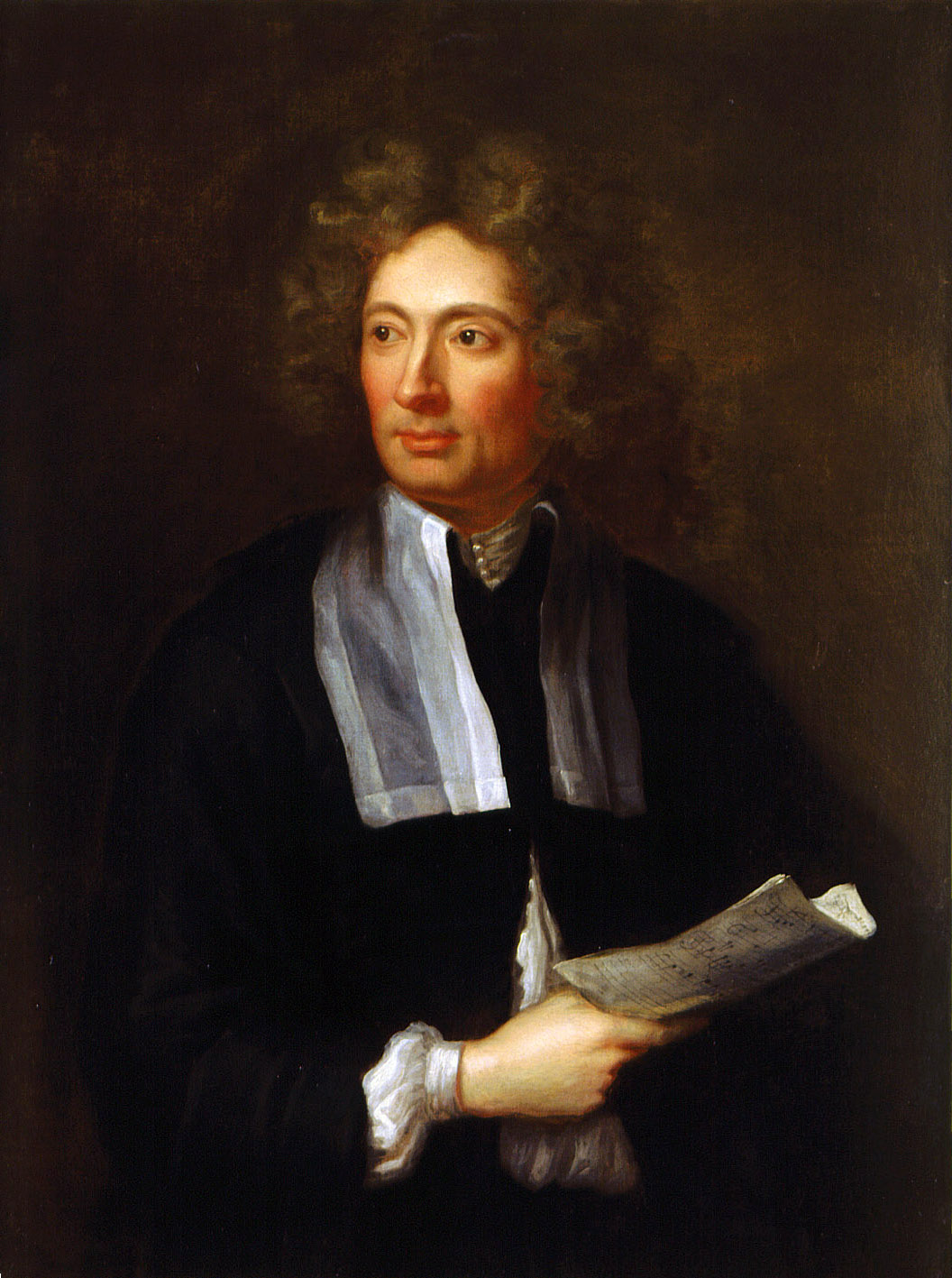
A portrait of composer Arcangelo Corelli (1653-1713), by Hugh Howard (1697). Source: Wikimedia Commons.
Musical Muscle
Although hardly an innovator, Corelli was one of the seventeenth century’s most influential composers. His music came to typify the Italian baroque and travelled far and wide across Europe. His formally rigid concerti grossi and trio sonatas were widely imitated. He was also regarded as the foremost violinist of his day. Works such as the popular Christmas Concerto as well as the others of the 12 Concerti Grossi, Op 6, are regularly performed.
The Goss
Corelli inspired a fare degree of jealousy amongst his contemporaries. They may be apocryphal, but the story that the notoriously badly behaved Jean-Baptiste Lully (himself a gay composer) had to chase the 19-year-old Italian lad out of Paris before he became too ‘well known’ is typical. Corelli’s reknowned hissy fit when Handel played a note on the violin that the Italian composer considered ‘unplayable’ is better documented.
Out and Proud?
Corelli was a favourite of Cardinal Pietro Ottoboni: distinguished patron of musicians in Rome, eminent poof and a man with an eye for a pretty face. His socially ‘protected’ status allowed him to live discreetly with a circle of male friends. From 1690 he lived at Ottoboni’s villa, La Cancelleria – an exclusive academy of male artists. Corelli was utterly devoted to another of the cardinal’s guests, the violinist Matteo Fornari, whom he met in 1682. He was “never far from Matteo’s side” for nearly twenty years, dedicating works to him, while Fornari oversaw the publication of the Opus 6 Concerti after Corelli’s death.
Phwoar Factor
Although he filled out a little in later life, and those wigs can hide a multitude of sins, the young Corelli is most prettily engraved. A cherubic face surmounted with extravagant curls. Arcangelo indeed!
Michael Tippett
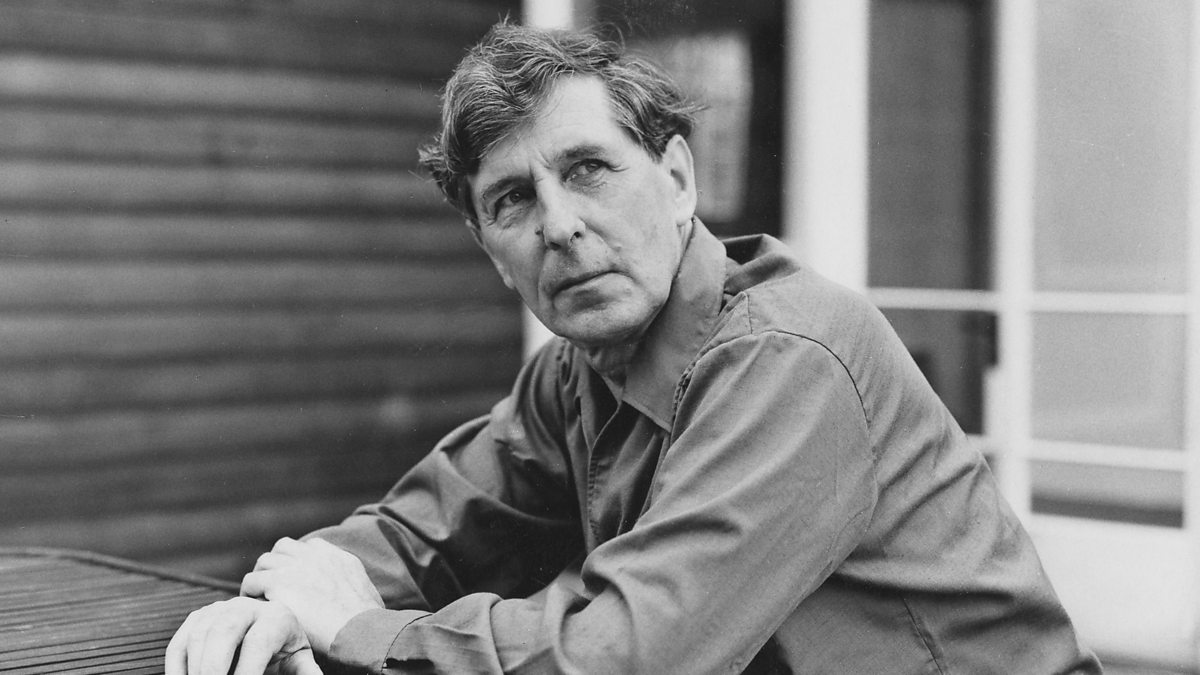
Musical Muscle
As with all things in his remarkable life, Sir Michael Tippett was something of a musical maverick. His essentially contrapuntal style developed throughout his long composing career, adapting and transforming influences from the likes of Byrd, Dowland, Purcell, Handel and Bach into something highly individual. In his latter work, a certain jazz and blues element becomes apparent, especially in Tippett’s unconventional use of electric guitar. His oratorio, A Child of Our Time, with its famous, and extractable Five Negro Spirituals, remains his most popular work, but his Concerto for Double String Orchestra and his Fantasia Concertante of a Theme of Corelli are also regularly programmed. It has been argued that King Priam is the greatest British opera ever written, even finer than those of Benjamin Britten.
The Goss
An atheist and Trotskyite, the openly homosexual Tippett had a way of confounding the gossips by telling everybody exactly what he thought and felt before they had a chance to speculate. He wrote an essay disproving the existence of God at preparatory school and had to be removed from Fettes College after admitting an affair with another boy. Like his mother who was a suffragette, Tippett was a humanitarian and pacifist, but unlike Britten who conveniently got ‘stuck’ in America for most of WWII, Tippett put his money where his mouth was and served a jail sentence as a conscientious objector.
Out and Proud?
You betcha! One of the few twentieth century composers who examined and discussed his own sexuality, Tippett was a brave light in a period of relative darkness. Unlike the tight-lipped Britten, he was out there almost waving the rainbow flag. Not that he had it easy: “Being unable to enter into a biological relationship with a woman, it seemed that I was excluded from an understanding of half the human race”, he wrote. His relationship with Wilfred Franks, a young painter, produced, in his own words “the deepest, most shattering experience of falling in love”, and was “a major factor underlying the discovery of my own individual musical ‘voice’. ”
The first composer to seriously portray gay characters in his operas The Knot Garden and King Priam, and to explore the possibilities of bi-sexuality, Tippett was a true pioneer.
Phwoar Factor
A tall, rangy youth, Tippett definitely had a sexual charisma as a young man. A certain carelessness in matters of dress and an untameable mop of hair lent him the air of a mad-professor in mid-life but a tendency to join the bow-tie and blazer brigade gave him a surprisingly rakish air in old age. I have vivid memories of the elegant composer in the 1990s, still standing tall in a crowd despite his advanced years.
Power Couple: Samuel Barber & Gian Carlo Menotti
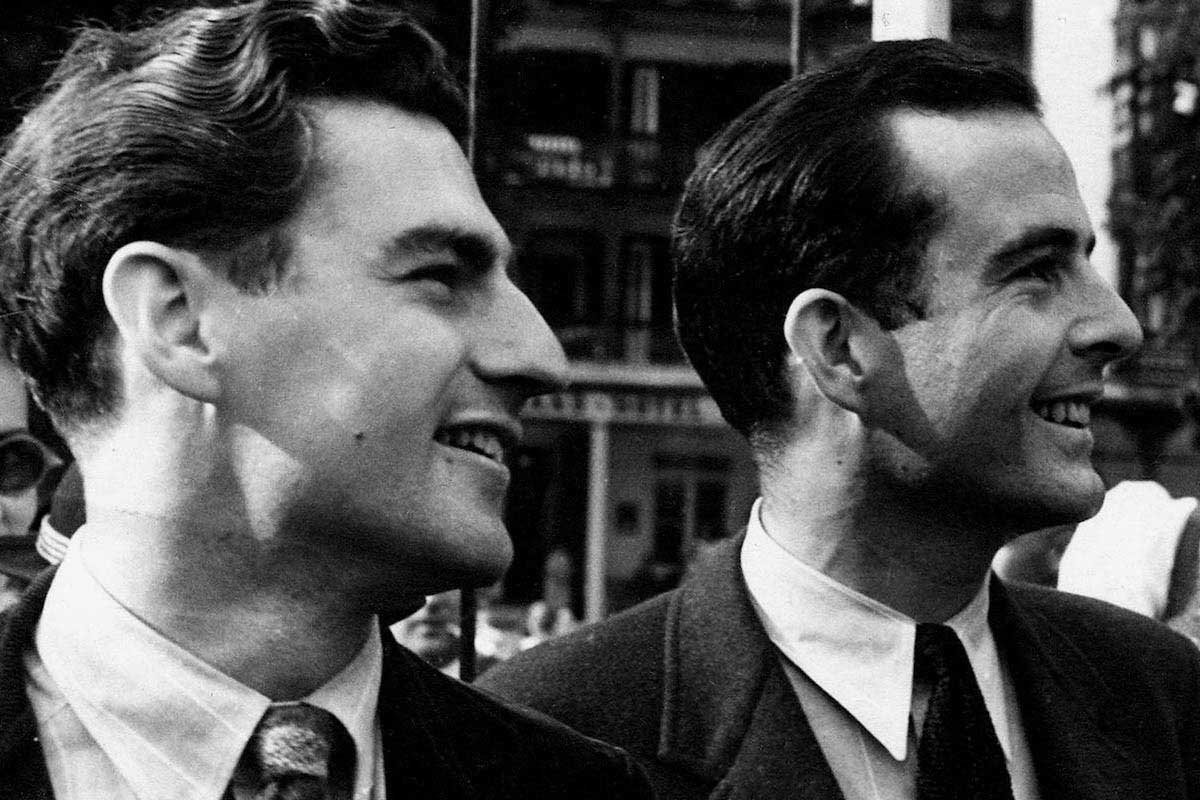
Menotti and Barber.
Musical Muscle
Barber is one of the great American composers of the twentieth century, having achieved fame early in life and been celebrated for most of his musical career. His tonal style, sophisticated, yet accessible, produced the Adagio for Strings, one of classical music’s most recognisable hits. His violin concerto, Hermit Songs and the ravishing Knoxville, Summer of 1915, are also regularly performed. He won two Pulitzer Prizes for his opera Vanessa and for his piano concerto.
His lover, partner and muse, the Italian born Gian Carlo Menotti was also a successful composer in his own right. His children’s opera, Amahl and the Night Visitors is a Christmas favourite. Like Barber, he also won two Pulitzer Prizes, for his operas The Consul and The Saint of Bleecker Street. He was also a talented librettist, writing the texts for all of his own operas as well as two of Barber’s. In 1958, Menotti founded the Spoletto Festival, expanding it in 1986 by founding the Melbourne Spoletto Festival – now the Melbourne International Arts Festival.
The Goss
Barber was quick to recognise his passion for music. In a letter which reads like a coming out confessional, aged nine he wrote: “Dear Mother: I have written this to tell you my worrying secret. Now don’t cry when you read it because it is neither yours nor my fault. I suppose I will have to tell it now without any nonsense. To begin with I was not meant to be an athlete. I was meant to be a composer, and will be I’m sure. I’ll ask you one more thing.—Don’t ask me to try to forget this unpleasant thing and go play football.—Please—Sometimes I’ve been worrying about this so much that it makes me mad (not very)”.
Menotti was once described as a combination of saint and devil, capable of great kindness, but at other times full of intrigue. He famously garnered crucial publicity for an operatic double bill by tricking Toscanini into attending. Menotti was a flamboyant, extravagant man, accumulating houses willy-nilly. In 1974, he bought the ancestral home of the Marquess of Tweeddale in East Lothian, primarily because of the acoustics of the main room. In typical Menotti style, he referred to himself in residence as “Mr McNotti”.
Out and Proud?
Barber and Menotti met as students at Philadelphia’s Curtis Institute of Music and soon fell in love. They quickly moved in together, sharing a house for over forty years. Sadly the relationship broke up in 1973, contributing to the decline in Barber’s health. In 1974, Menotti surprised everyone by adopting Francis ‘Chip’ Phelan, an American actor and figure skater as his son.
Phwoar Factor
Both Barber and Menotti were handsome young men, the latter especially with his classic Italian looks. Barber, the shorter of the two, had a clean cut, slightly preppy appearance but drink, alas, took its toll in later life.
Benjamin Britten
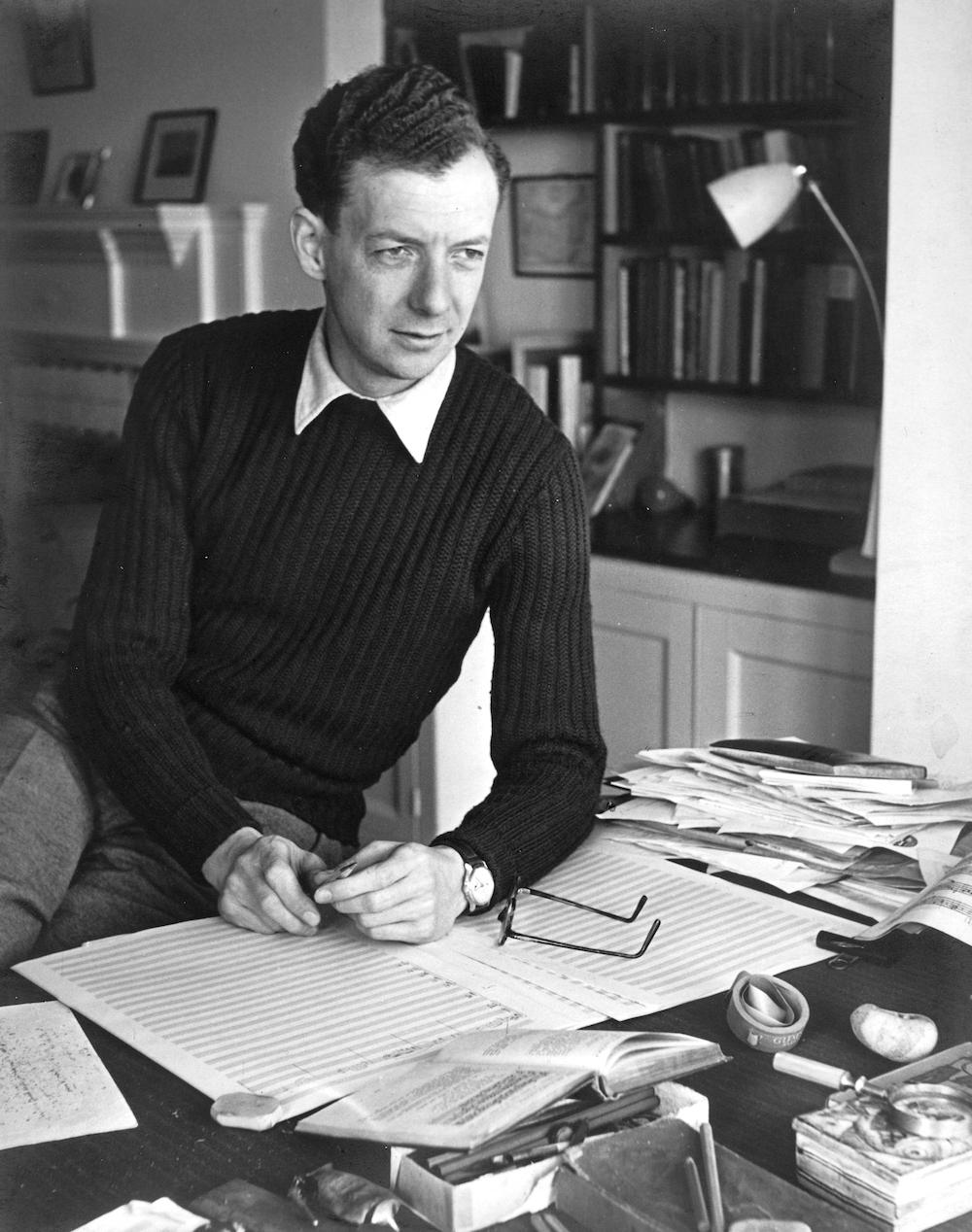
Musical Muscle
Undoubtedly one of the major musical figures of the 20th century, Britten combined multiple careers as composer, conductor and pianist. A child prodigy, he was the wunderkind of British music for many years until the premiere of his opera Peter Grimes catapulted him to international fame and fortune. His output includes orchestral music and chamber works but it is for his contribution to choral music, opera and song that he is best known. He also composed a large body of work for children and amateur performance. Much of his music is regularly performed including The Young Person’s Guide to the Orchestra, the War Requiem, A Ceremony of Carols and the operas Billy Budd and A Midsummer Night’s Dream. He was the first British composer to be given a life peerage, becoming the rather incongruous Baron Britten of Aldeburgh.
The Goss
As a man who lived with another man for most of his adult life, Britten was an obvious target for the gossips. Irrespective of his sexual orientation, however, there was more controversial speculation, most of it after his death, regarding his intense friendships with a string of adolescent boys. It seems clear from his portrayal of Miles and Tadzio in The Turn of the Screw and Death in Venice respectively that he was fascinated with the sexual nature of children. No evidence of impropriety has ever come to light, but the composer had a marked habit of transferring his attentions once a boy reached sexual maturity. Recent suggestions that he died of complications associated with tertiary syphilis have been hotly contested in the media.
Out and Proud?
Britten was initially cagey about his sexuality – a shameful situation as ‘out there’ poet WH Auden saw it. But then Auden was older by ten years and notoriously lax in his ablutionary habits so it’s possible that Britten just didn’t fancy it. The composer never spoke openly about his lifelong relationship with the tenor Peter Pears but their marital arrangements were never in doubt. As Pears himself succinctly put it, “we are after all queer and left and ‘conshies’, which is enough to put us, or make us put ourselves, outside the pale, apart from being artists as well”. Their love letters, many of which have been published, make for a touching read. Significantly, when Britten passed away, the Queen wrote Pears a letter of condolence.
Phwoar Factor
A rather willowy youth, Britten matured into a slightly professorial looking man, although he never lost a certain boyish charm. With his ‘terribly terribly’ English accent – the curse of the times – he might have come across as a rather prissy figure, but clearly there were no complaints from Peter Pears, who called Ben his “Honey Bee”.












Comments
Log in to join the conversation.